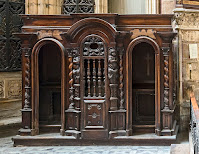He avoided much discussion of penance.
Penance is another of those issues within Christianity that has caused much upheaval.
Catholicism's Sacrament of Penance can be interpreted from within what is called the Governmental Theory of Atonement--Christ died for humankind, every member within a social order, but as members of that social order, not necessary as individuals. That is, Christ did not suffer for each person's sins, which statement would have been a tremendous relief to my pre-teen self. (My mother made the Governmental Theory argument when I express horror at causing Christ pain, but I think she did so from what I will call the Mythic Version of the Atonement: Aslan dies for Edmund but not in some legalistic sense. He dies to free Edmund, not to even an imaginary score, whatever others claim.)
 |
But it was two chairs, not a group meeting.
Protestants in nineteenth-century America were entirely opposed to the Sacrament of Penance. They argued that it involved priests forgiving sins--and only God can forgive sins. The Catholic priest does utter the words, "I absolve you from your sins in the name of the Father, and of the Son, and of the Holy Spirit." Contrary to criticisms of antimonianism (Catholics can do whatever, once absolved!), this absolution refers only to the offering of grace. The temporal consequences remain and may extend into the next life.
 |
| Love those 19th-century titles! |
Protestants also objected to the intimacy of the confessional. Ex-Catholic Joseph Blanco White, writing in the 1820s, sounds almost modern on the subject: "There is something in auricular confession which has revolted my feelings [from childhood]...as a protection to my life and liberty, with scorn and contempt in my heart." Another, Antonio Gavin, writing in the eighteenth century, objects to the close questioning by the religious leader. He declares that priests have been told not to be so nit-picky, yet they are "motivated in practice primarily by...curiosity."
And still more Protestants and ex-Catholics published lots and lots of (largely false, though not entirely) "news" about Catholic priests taking advantage of the confessional to get women pregnant. The truth of most of these stories is debatable but the underlying reality remains: the confession was personal and intimate. Even today, according to Wikipedia, "Phone absolutions are considered invalid."
In terms of doctrine, while rejecting the Sacrament of Penance, early Protestants in America were conflicted. The problem of "okay, that person said sorry and asked for forgiveness--but how do we KNOW!?" couldn't be shaken. There is something (not altogether tasteful) within the human spirit that insists that "good" people can't just say they are good. The social order has to accept them as good.
After all, Protestants in New England had thrown out the easiest way to KNOW: actions. They had a reason to throw out that easiest way--actions so often turn into performances and indulgences, markers of goodness rather than actual goodness--but the Calvinists didn't make their lives any easier by wanting some other type of proof. In her book on Charlotte Perkins Gilman, Ann J. Lane comes closest to explaining this "proof" as any writer I've encountered so far:
Only those few who underwent an experience of "conversion" might be among the elect and thus permitted to enter heaven...[conversion was] an experience of affirming the Calvinist religion...[which] probable membership [in the church already demonstrated].
I cannot speak for current-day Calvinism, but this "true" conversion was a factor in early American Calvinism and with the arrival of the Enlightenment, came down to specific moment, a recognized instant epiphany/change followed by an authentic public confession (how to recognize the confession's authenticity was a matter of some debate). There was a great deal of worry over children of parents who were born into the faith but who hadn't "truly" converted. Should the children be accepted or not?
 |
| Note the passive voice. Still-- |
But what about about that proof? 
The Sermon on the Mount in The Book of Mormon emphasizes that neither the confession as a sacrament nor the exact type of conversion is the criterion for final judgment. We are drawn to what we want and create: “For where your treasure is, there will your heart be also” (3 Nephi 13: 21).
Later scriptures in 3 Nephi continue to emphasize the same idea. Regarding a passage that has been taken radically out of context, the church of Christ is defined as follows:
If it be called in my name, then it is my church if it so be that [the church as a group of people is] built upon my gospel. Verily, I say unto you that ye are built upon my gospel; therefore, ye shall call whatsoever things ye do call in my name; therefore, if ye call upon the Father [on behalf of] the church, if it be in my name, the Father will hear you. And if it so be that the church is built upon my gospel, then will the Father show forth his own works in it.
But if it be not built upon my gospel and is built upon the works of men or upon the works of the devil, verily I say unto you, they have joy in their works for a season and by and by, the end cometh, and they are hewn down and cast into the fire from whence there is no return. For their works do follow them. (3 Nephi 27:8-12, my emphasis)
Ultimately, people are not "saved" by proof. They are saved due to "their faith, and their repentance of all of their sins, and their faithfulness unto the end” (3 Nephi 27:19).


No comments:
Post a Comment